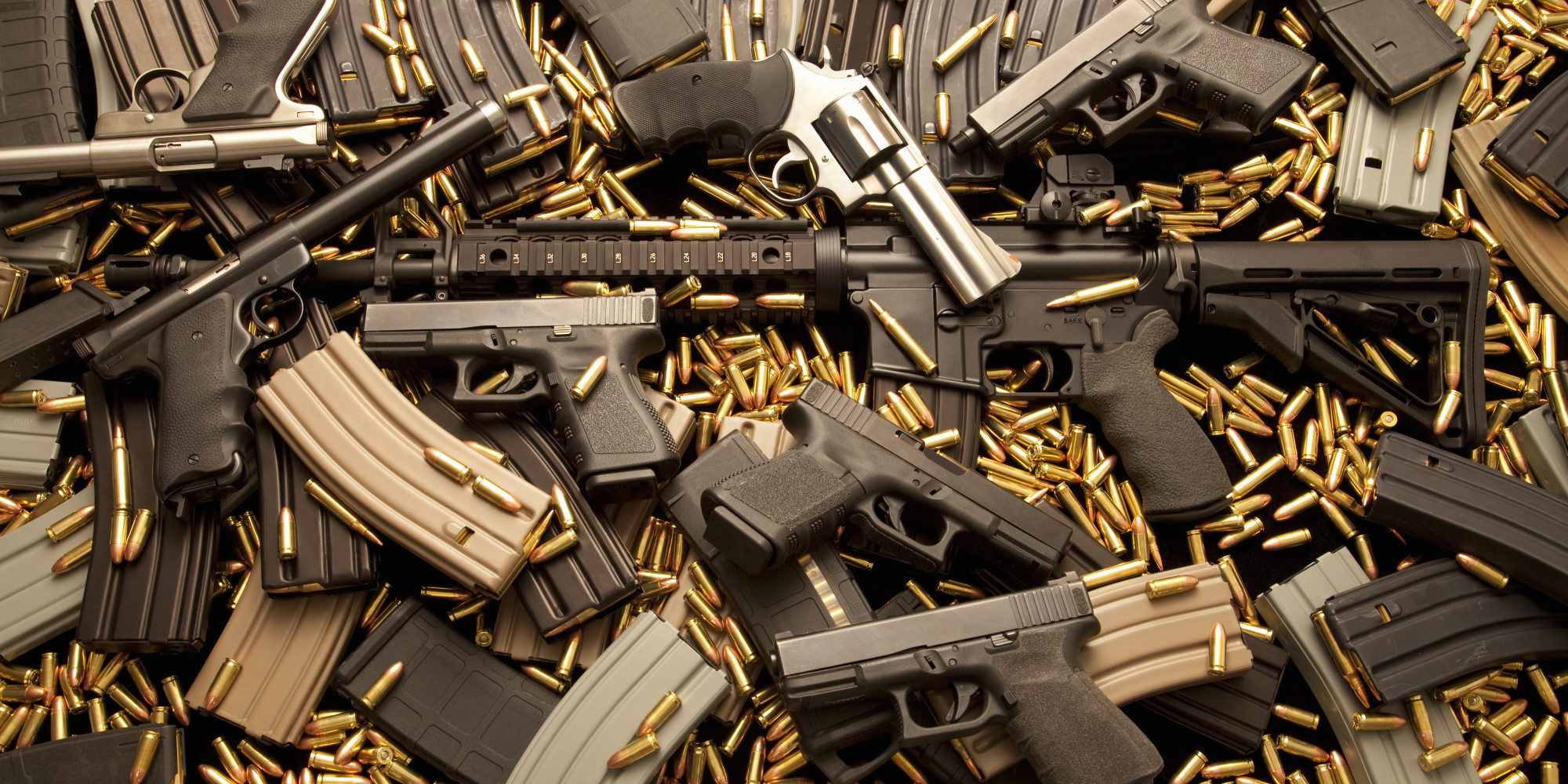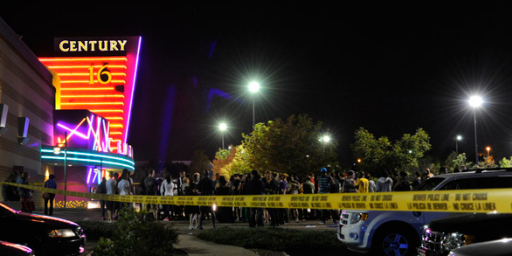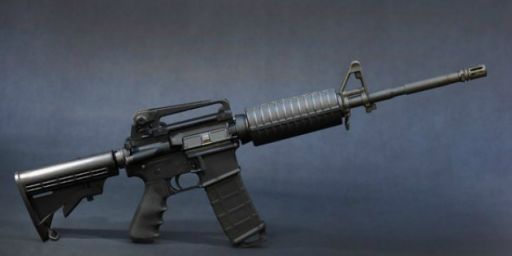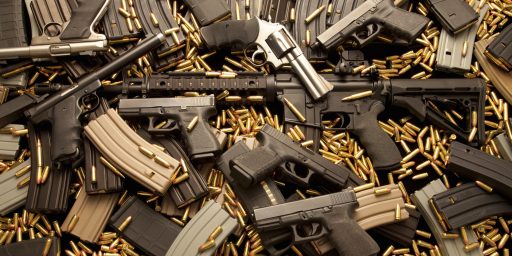Failures In Gun Laws Tied To Illinois Mass Shooting
The shooter who killed five people in a factory in Illinois on Friday should not have had a gun to begin with.

On Friday afternoon, a factory worker in Aurora, Illinois who was on the verge of being fired came to work with a handgun and opened fire, killing five co-workers and injuring five police officers. Now, initial reports are stating that he never should have owned a gun:
AURORA, Ill. — An angry worker who stormed through a suburban Chicago factory shooting his co-workers after being fired was barred from having the handgun he was carrying, the authorities said on Saturday.
Gary Martin, 45, who died in a shootout with the police after a rampage on Friday that left five workers dead and at least six other people wounded, had his state weapons permit revoked years ago because of a felony assault conviction, the police in Aurora, Ill., said. Still, they said, Mr. Martin’s gun — a .40-caliber Smith & Wesson handgun with a laser sight — was never taken away.
“Some disgruntled person walked in and had access to a firearm that he shouldn’t have had access to,” said Kristen L. Ziman, the chief of police in Aurora, where the shooting took place.
Ms. Ziman said that the police were trying to determine why Mr. Martin still had a gun, despite having his permit revoked five years ago.
According to Illinois gun law, a person must be granted a Firearm Owners Identification card, or FOID, to possess a firearm. At least two million people in the state have the cards.
But under the law, the process of removing firearms from people whose cards have been revoked is weak, making it easy for some to keep their weapons with little threat of enforcement or penalty.
That appears to have been the case with Mr. Martin, who the police said received a card in January 2014. That March, he applied for a concealed-carry permit, and a background check revealed that he had a felony conviction for aggravated assault in Mississippi from 1995. With that, the Illinois State Police revoked Mr. Martin’s card and mailed him a letter ordering him to relinquish his firearm and card within 48 hours.
The statute allows law enforcement agencies to petition the courts to seize weapons if they aren’t turned in, but in many instances, the remaining weapons go unchecked. Experts said that the state rules — without a clear, mandatory enforcement requirement — leave a gaping loophole for those who choose not to give up their guns. In 2016, only about 4,000 of the 11,000 people whose cards were revoked submitted the mandatory reports explaining what they did with their guns, The Chicago Tribune reported in 2017.
Sgt. Bill Rowley, a spokesman for the Aurora Police Department, said the police had no record of being notified by the state police that Mr. Martin had not volunteered his firearm as required in 2014. It was unclear whether Mr. Martin, who lived in Aurora at the time of his death, also lived there in 2014.
The conviction in Illinois isn’t the only violent felony on Martin’s record. The Chicago Sun-Times reports that the felony conviction was for stabbing a woman. However, this conviction occurred in Mississippi in 1995. While the Brady Handgun Violence Prevention Act became law in 1993, the NICS system that allows for easy searches of criminal records from around the country was not fully implemented until 1998, so it’s possible that Martin’s 1995 conviction had not been entered in the system at the time he purchased the weapon. Martin had also been reported for domestic violence, although it doesn’t appear that those charges were ever pursued. Nonetheless, that doesn’t answer the question why his weapon was not seized when it should have been.
What appears to have happened here represents both a failure to enforce existing laws and what may be loopholes in existing Illinois law that made it possible for Martin to keep his gun notwithstanding his conviction. The law makes clear that after Martin’s conviction five years ago, and the subsequent loss of his gun permit, the gun should have been seized by law enforcement. This process appears to require law enforcement to apply to a court with jurisdiction over the matter for an order mandating that Martin turn the gun over and giving the police the right to seize the gun if he refuses to do so. However, from the descriptions I’ve read the law lacks a mandate that specifically requires law enforcement to seize weapons upon conviction. Without such a requirement, cases such as Martin’s apparently slip through the cracks and he was allowed to keep the weapon that killed five people on Friday and injured five others. As of yet, there’s no explanation for why this happened in the Martin case, but if it happened here then it has probably happened in other cases.
In many ways, this case is reminiscent of the 2017 shooting at a church in Sandy Springs, Texas that left more than twenty people dead. In that case, the shooter passed the Federally mandated background check and was thus able to legally purchase the weapon he used in the shooting. This happened notwithstanding the fact that he had several convictions for violent domestic violence incidents from his time in the Air Force. The background check failed to find these convictions, though, because they were never reported to the national background check system by the Air Force even though they should have done so. Further investigation revealed that this was a systemic issue for the Air Force and that the service had failed to report convictions to the national database for an extended period of time, meaning that there are an unknown number of people out there with Air Force criminal records who may have guns that they shouldn’t have been able to have access to. Not surprisingly, three U.S. cities have filed suit against the Air Force over the failure to report convictions as required. The Aurora case also bears similarities to a case arising out of a shooting last April in Nashville. In that case, the shooter had been convicted in Illinois and had his guns taken away only to have them returned to his father, who turned around and gave them back to the shooter.
As I said, at this point it’s unclear whether Martin was allowed to keep his gun due to a failure by law enforcement to act as required by law, or whether the law fails to properly mandate that they act, to begin with when a gun owner is convicted. Of course, even if there is a gap in the law, that isn’t really an excuse for the failure to act because, at the very least, the existing law does give law enforcement grounds to seek a court order to seize a felon’s weapons upon conviction for certain offenses. Why that did not happen in Martin’s case is unclear and should obviously be the focus of an investigation. Additionally, it’s possible that the law itself should be amended to make the seizure mandatory upon conviction, perhaps with the proviso that the gun cannot be destroyed or otherwise disposed of until the Defendant has exercised his available appeals. Whatever the case, though, had the law been followed here then Martin would not have had the gun he used to murder five people and his conviction means that he would not be able to legally purchase a new weapon. Had that happened in this case, then it’s likely that five people would still be alive today.






That’s why the tack being taken by Gov. Pritzker is wrong. Illinois doesn’t need tougher laws. It needs better enforcement. All the laws in the world won’t help if you don’t enforce them.
@Dave Schuler:
My understanding, though, is that the current law doesn’t necessarily make seizure of weapons from a convicted felon mandatory. That is one loophole the legislature could fix.
Or is my understanding of Illinois law flawed?
What gets me more is that he clearly must have lied on his ATF 4473, what is a federal felony in itself, plus the federal “felon in possession” charge that should have followed. So not one but two different law enforcement agencies failed here.
“Nonetheless, that doesn’t answer the question why his weapon was not seized when it should have been.”
It was seized–they demanded that he turn in his gun. That constitutes seizure. If you don’t believe me ask Jay Tea or one of the other gun boyz.
@Dave Schuler:
The problem is that there is only limited things that Illinois can do for themselves, specially because these American guns flood criminal gangs in Latin America, where American guns like the AR-15 were more popular than the AK-47 and where research shows that most guns comes from Miami.
It’s not a problem limited to large cities in Blue States.
People kill people with guns in this country because they can.
@Just nutha ignint cracker: It seems that getting them to turn their guns in is a problem. California is having trouble with that too. Short of the police going into someone’s home to search, I don’t know what they could do. The gun owner could just say that the gun is lost.
If the police seize it, do they have to reimburse the owner for the value of the gun? I have wondered about that.
What if the police go into the wrong home?
@Tyrell: Two different possibilities:
A) you bought the gun illegally (like in this case as a convicted felon). The gun should be seized as you’re a felon in possession.
B) You become ineligible, e. g. due to a domestic violence arrest. In that case you’re obligated to dispose of the gun (permanently or temporary) but you don’t lose title, aka you can sell it via a FFL dealer, or give up control.
CA made it mandatory that you do a new background check and waiting period when you want your guns back after you got cleared, that didn’t make that measure popular. I read it was in court, but no idea how that case ended.
@Tyrell:
Police going into the wrong home is not unique to the “problem” of gun confiscation. Police go into the wrong home all the time. And fire at the people in that home, too.
Of course, I’m old, white, and middle class, so I don’t worry about it happening to me that much.